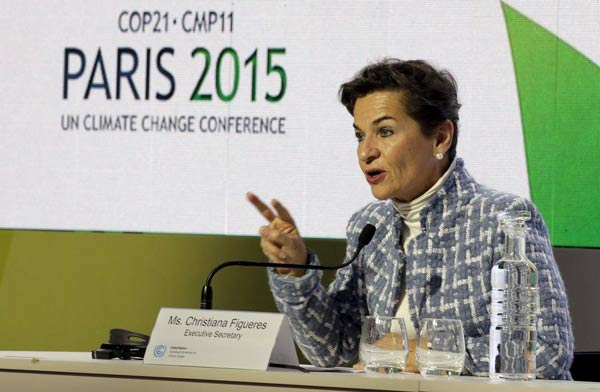UN climate talks resume to write 'rule book' for Paris Agreement
Updated: 2016-05-17 11:48
(Xinhua)
|
||||||||
 |
|
Christiana Figueres, Executive Secretary of the United Nations Framework Convention on Climate Change (UNFCCC), attends a news conference during the World Climate Change Conference 2015 (COP21) at Le Bourget, near Paris, France, in this December 7, 2015 file photo. [Photo/Agencies] |
BERLIN -- Climate officials from around the world returned to the negotiation table on Monday to write a "rule book" for the Paris Agreement, a historic pact they clinched at the end of last year in France to fight global warming.
By adopting the Paris Agreement, nearly 200 countries agreed to jointly take actions to limit global temperature rising well below two degrees Celsius above pre-industrial levels, while pursuing efforts to keep global warming under 1.5 degree Celsius.
Details of how to implement the agreement, however, was left for further negotiations.
"The whole world is united in its commitment to the global goals embodied in the Paris Agreement, as well as to the means by which to achieve them," said Christiana Figueres, executive secretary of the United Nations Framework Convention on Climate Change, at the opening plenary of the new round of talks in Bonn, Germany.
"Now we must design the details of the path to the safe, prosperous, climate neutral future to which we all aspire," she said.
When officials leave Bonn in May 26, they are expected to have in their mind clearer pictures of various issues, including regular reviews and "ratchet up" of countries' climate actions and transparency of developed countries' financial support to developing countries.
Researches showed that even if all current climate action plans of countries were fully implemented, the world is on a path towards a temperature rising of about 3 degrees Celsius by the end of the century.
"We have no time to lose, because the world is waiting for us to implement the Paris Agreement," said Segolene Royal, French environment minister and president of the UN Climate Change Conference in Paris.
Figueres said she is confident that the pace of negotiations will be faster than in past years as countries now understand the threat of climate change and opportunities of transforming their economies.
A proof is the record number of countries which have already signed and ratified the Paris Agreement. Currently, 177 nations have signed the pact, 16 among them have completed their domestic ratification procedures.
However, analysts warned that old quarrels between the developed and developing countries might re-emerge despite an overall trend of collaboration.
In a press conference later on Monday, the European Union's chief negotiator Elina Bardram reiterated that the EU will not revise its targets of reducing carbon emissions by 20 percent by 2020 and at least 40 percent by 2030 compared with 1990 levels, targets which some developing countries and environment activists said were too low as the bloc had already reduced its emissions by 19 percent by 2013.
"The EU's 2030 climate and energy framework is a very very ambitious policy," she argued.
Financial support to developing countries is another hot topic of the negotiations.
On Monday, the BASIC group and a larger "G77+China" bloc which represents over 130 developing countries also urged developed countries to fulfill their 2009 commitment of providing 100 billion US dollars per year by 2020 to developing countries.
"For our endeavors to be achieved, enhanced and adequate financial and technology support as well as capacity building must be provided to allow for effective action both pre-2020 and beyond," said "G77+China" in a joint statement.
Salaheddine Mezouar, Morocco's Foreign Minister and incoming President of the UN Climate Change Conference in Marrakech told negotiators that he expected the annual climate summit in November to be an occasion when a road map for concrete and predictable provision of the 100-billion-U.S.-dollar would be prepared.
- Global health entering new era: WHO chief
- Brazil's planning minister steps aside after recordings revelation
- Vietnam, US adopt joint statement on advancing comprehensive partnership
- European border closures 'inhumane': UN refugee agency
- Japan's foreign minister calls A-bombings extremely regrettable
- Fukushima impact unprecedented for oceans: US expert

 Stars of Lijiang River: Elderly brothers with white beards
Stars of Lijiang River: Elderly brothers with white beards
 Wealthy Chinese children paying money to learn British manners
Wealthy Chinese children paying money to learn British manners
 Military-style wedding: Fighter jets, grooms in dashing uniforms
Military-style wedding: Fighter jets, grooms in dashing uniforms
 Striking photos around the world: May 16 - May 22
Striking photos around the world: May 16 - May 22
 Robots help elderly in nursing home in east China
Robots help elderly in nursing home in east China
 Hanging in the air: Chongqing holds rescue drill
Hanging in the air: Chongqing holds rescue drill
 2.1-ton tofu finishes in two hours in central China
2.1-ton tofu finishes in two hours in central China
 Six things you may not know about Grain Buds
Six things you may not know about Grain Buds
Most Viewed
Editor's Picks

|

|

|

|

|

|
Today's Top News
Liang avoids jail in shooting death
China's finance minister addresses ratings downgrade
Duke alumni visit Chinese Embassy
Marriott unlikely to top Anbang offer for Starwood: Observers
Chinese biopharma debuts on Nasdaq
What ends Jeb Bush's White House hopes
Investigation for Nicolas's campaign
Will US-ASEAN meeting be good for region?
US Weekly

|

|









